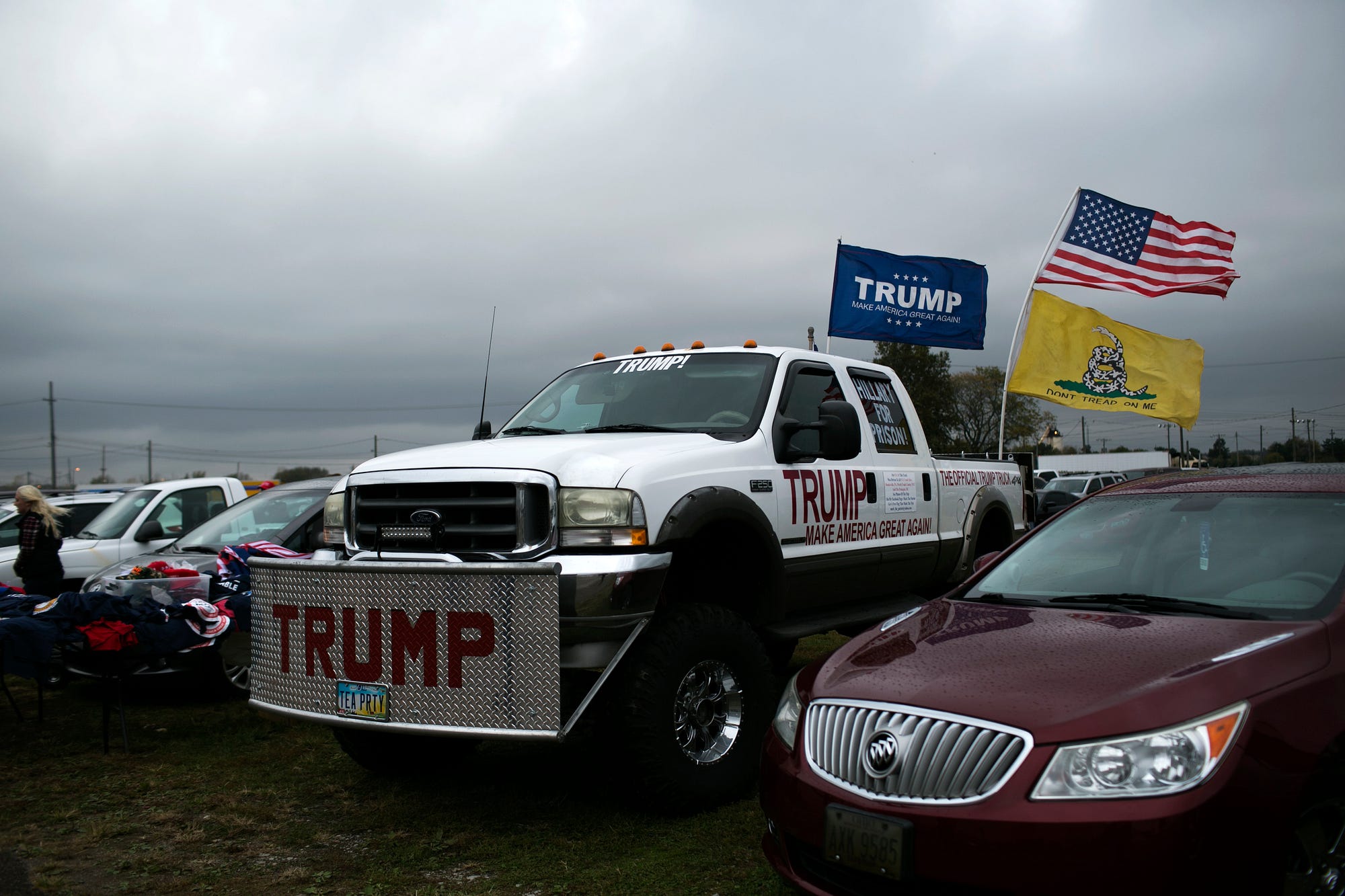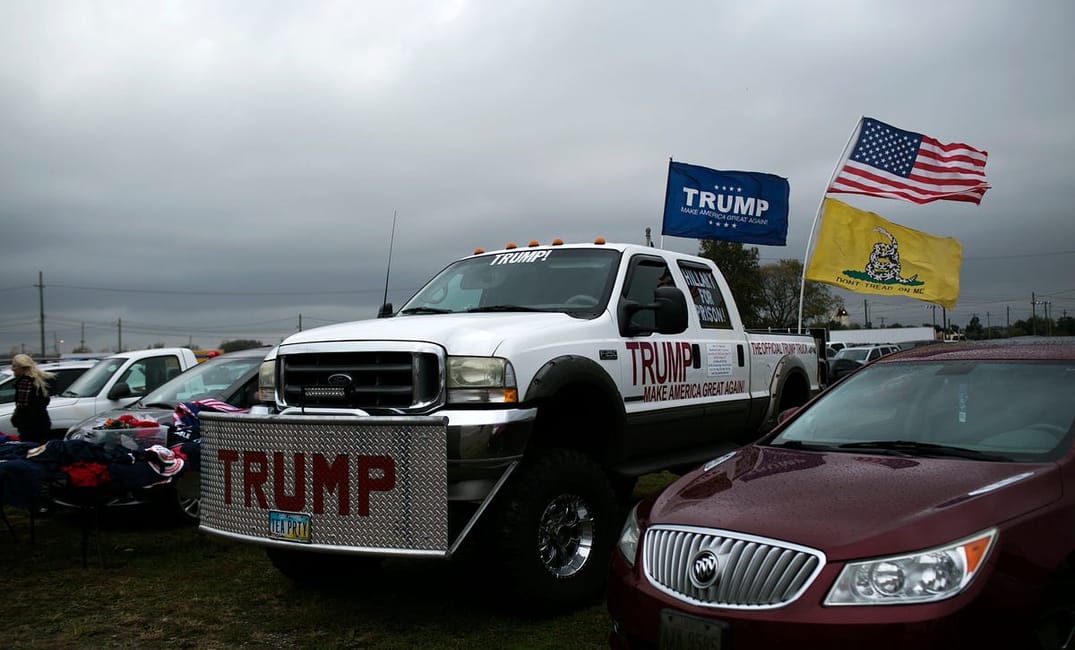
In the weeks leading up the election, there have been murmurs of a movement for Trump growing in the Bay Area — or at least, that his supporters here seem to be emboldened this year. This fall, a few freeway overpasses have been overtaken by Trump flags and flotillas — including this past weekend when roughly 350 trucks packed with more than 1,000 demonstrators paraded through Marin City — in addition to several Republican “free speech” rallies throughout the Bay.
These demonstrations are always a bit shocking in the deep blue Bay Area. To say Trump supporters are outnumbered in our notoriously progressive region would be an understatement. So far in the 2020 election, only 1% of the $58 million raised in San Francisco has gone to Republicans or conservative groups. The last time San Francisco had a Republican mayor was 1958. As one Trump supporter put it, “we’re isolated.” Fed up with the Democrat’s dominance in the state, some Republicans have been packing up and moving away.
The Trump rallies that locals have witnessed this year seemed futile. There’s no way California would go red. So I wanted to know: What motivated these people to come to a Trump rally? Who were they? How could they have developed such opposite political views to most in the liberal enclave they live in — and hold those views so strongly that they wanted to voice their support publicly?
Sign up for The Bold Italic newsletter to get the best of the Bay Area in your inbox every week.
So I asked. I joined a Facebook group for Greater Bay Area “conservatives living behind the trenches.” I went to two rallies, talked to Bay Area residents who supported Trump, and interviewed leaders of the Bay Area Republican Party. Supporters have held a number of other rallies, too, from Silicon Valley to the East Bay.
When I told a friend I was writing a story about local Trump supporters, she asked me if I had found any. And I did. I found more Trump supporters than I expected, many of whom were quick to defend their own morality in the face of what they saw as unwarranted moral judgment and who were gathering to feel united in their opposition to the Bay Area progressive order. To my surprise, I found myself asking what these conversations were telling me about where we go from here, after the 2020 election.
Turns out, 9.23% of San Franciscans voted for Trump in 2016. That means San Francisco ranks fifth in a list of America’s bluest cities. But that also means almost 38,000 people there cast their vote for Trump, many from some of the city’s wealthiest neighborhoods. Support for Trump is greater in nearby counties — on average, about a fifth of votes in the nine Bay Area counties went to Trump — though supporters are still the minority by a long shot.
When I showed up at a rally in Pleasanton, a wealthy suburb in Alameda County, over 2,000 people filled the parking lot of a mall with trucks and flags reading “Trump 2020: No More Bullshit.”
“Look around you,” said Danny Vera, a Trump supporter from Hayward I met at the Pleasanton rally, gesturing to the full parking lot. “This is the silent majority.”
While certainly not close to the majority around here, it did seem like quite the crowd of Trump supporters for the Bay. While we don’t have the numbers, local Republicans are saying there’s more vocal support than they’ve seen before.
“I’ve never seen enthusiasm for a Republican presidential candidate in the Bay Area like I’ve seen with Donald Trump,” said John Dennis, the chairman of the San Francisco Republican Party who ran against Nancy Pelosi for Congress three times. The last Republican presidential candidate to receive this kind of support must have been Ronald Reagan, mused Hugh Bussell, the chairman of the Alameda County GOP.
Virtually every Trump supporter I spoke with defended their morality. Without my prompting, several assured me that they weren’t racist.
No one expects Trump to flip the Bay Area counties. In fact, a recent poll by the University of California, Berkeley showed Biden ahead of Trump by 39 points in California, a greater margin of victory than Hillary Clinton’s record-breaking 28 point victory over Trump in the state in 2016. But those who do support President Trump might be speaking out louder than ever, at a time when their support is met with intense opposition.
For fear of being blackballed, local Ken Loo told me he kept quiet about his politics for a long time, and he said many other Bay Area Republicans do the same. He lived in the same apartment for five years before he realized that his neighbor shared his political views.
“You get pushed into silence in San Francisco. You can’t admit to your friends you’re a Republican without being ostracized,” Loo said. Now, Loo is running for city council in Belmont, about 20 miles south of San Francisco.
Loo called the rallies the Republican version of “safe spaces.” Yikes, I thought, but let him continue. The term typically refers to a place where people from marginalized groups can safely come together, and it has seen its share of criticism from the right. I’d heard Republicans mock the term on social media, but I got the impression Loo didn’t mean it that way. In the face of increasing opposition to Republicans in the Bay Area, Loo said, people are now looking for a place to share their political identity without fear of retribution.
I met one professor from the University of California, Davis at the Pleasanton Trump rally who all but ran away from me, afraid of losing his job.
Virtually every Trump supporter I spoke with defended their morality. Without my prompting, several assured me that they weren’t racist.
Throughout his presidency, Trump has refused to condemn white supremacist groups, most recently telling the hate-group Proud Boys to “stand back and stand by” during the second presidential debate, a comment that the group celebrated online and immediately added to their logo.
While we were talking, one man at the Pleasanton rally even pulled over a Black Trump supporter — Dwayne Burns — and told me this man was why he was voting for Trump. To me, it felt like the white guy was tokenizing Burns, using him to morally justify his political views. But Burns took the moment in stride and then steered our conversation toward the hate he feels from the mostly liberal Black community for his conservative values. Many chafed against what they saw as the moral superiority on the part of Democrats and the press. I met one professor from the University of California, Davis at the Pleasanton Trump rally who all but ran away from me, afraid of losing his job.
The moral judgment these Trump supporters were picking up on is evidence of polarization, and it has intensified in recent years, according to Jaime Settle, an associate professor at the College of William & Mary who specializes in psychological polarization. People have grown stronger negative feelings toward the people from the opposing party.
“We’ve watched psychological polarization grow over time,” Settle said. “And the Trump campaign and presidency has accelerated it.”
Polarization is so extreme that scholars are using a new term to characterize it: dehumanization. Not only do people dislike those who belong to the other party, now they see them as “less than fully human.” Republicans and Democrats are equally willing to dehumanize members of the other party, according to a 2019 study. Those who hold the strongest views are more likely to dehumanize others, and more likely to distance themselves from those who disagree.
In a progressive stronghold like the Bay Area, it makes sense that partisan dehumanization and polarization would be rampant. “It becomes increasingly difficult to imagine or understand the logic that people with different viewpoints hold because you just don’t encounter it,” Settle said.
In the polarized climate, more aspects of people’s identities have become politicized, Settle said. Not only do people use demographic categories like age, race, and education to make assumptions about people’s political views, but a host of lifestyle choices have also become attached to our political identities. Take, for instance, a white woman who drives a Prius to a farmers market and ogles the organic produce — Biden supporter, no question. Social media has exacerbated the politicization of these lifestyle choices by increasing people’s exposure to them, Settle explained.
Some of the Trump supporters fulfilled those identity stereotypes: bikers brandishing MAGA flags and touting our constitutional, God-given rights. Bob Green from Danville, who said he wears his MAGA hat every single day, said he’d “never heard Trump say a racist thing” and called former President Barack Obama the most racist president we have ever had. So… yeah.
Most people I saw at the rally were white, but some Trump supporters didn’t fit the mold. I met Andrew Martinez, a mixed-race man from Oakland’s Fruitvale neighborhood, and his Latina mom, Dede Gavina, who was raised in Berkeley on Chicano power and whose switch to Republican led to severed family ties (“they hate me,” she said). There was Dwayne Burns who I mentioned, a Black business owner from Brentwood who was tired of Democrats “playing the race card.”
At the tiny Walnut Creek rally, one of three Trump supporters was a transgender 17-year-old, a first-generation Mexican immigrant named Dani Luna, who said that her mom struggled to accept her when she came out as transgender, but that it was harder for her mom to accept her second coming out story — as a Trump supporter. The people I talked to believed that Trump was better for the country and for them personally, not in spite of their identity but because of it.
To be sure, a minority of Black and Latinx Americans voted for Trump in 2016 — Trump won 8% of the Black vote, 29% of Latinx voters, and 29% of Asian voters. But meeting these voters does call into question the assumptions some Democrats make of Trump supporters.
Thoughts of the future hovered over all my conversations with Trump supporters, a storm cloud of misinformation and polarization in the making. Today, Americans will elect our next president. Republicans in the Bay Area won’t play a role in that choice — instead, the vote will be decided in a small number of swing states. But the 500,000 plus Bay Area Trump supporters are also not going away, at least not the bulk of them, just like the millions of others across America aren’t going away either.







